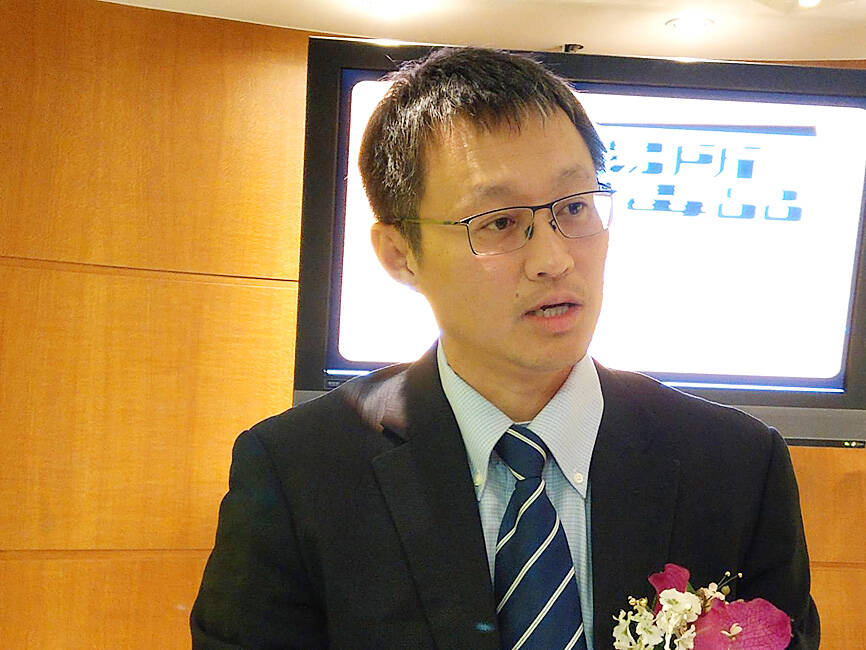NAND flash memory controller supplier Phison Electronics Corp (群聯電子) on Tuesday said it is scouting sites in Malaysia to set up a new research and development (R&D) center at the request of customers to diversify from China.
Since the US imposed an export ban on semiconductors to China in October last year, Taiwanese chip companies, including Phison, have faced requests from customers to diversify their manufacturing sites and R&D activities to boost supply chain resilience.
“We are in the process” of building an overseas R&D hub, Phison founder and CEO Pua Khein-seng (潘健成) said in Hsinchu. “It is relatively easier for us to build one in Malaysia.”

Photo: Vanessa Cho, Taipei Times
The new center might share part of the workload at the company’s R&D hub in Miaoli County, while an R&D center in the US focuses on developing high-end products, Pua said.
Building a new R&D team from scratch is an uphill task and time-consuming, said Pau, a Malaysian.
It is even harder to build one outside Taiwan, which has spent 45 years to develop a comprehensive chip ecosystem and supply chain that is rarely seen elsewhere in the world, he said.
Pua did not disclose a timeline for the Malaysian R&D center, but said customers from the US, Europe and Japan have been calling for it to diversify.
A chronic shortage of talent in Taiwan is another factor that prompted Phison to consider offshoring. As most technology companies in Taiwan are struggling to recruit skilled engineers, Phison sought to tackle the talent gap overseas, Pua said.
“Building overseas R&D centers and introducing overseas talent are vital for Taiwan to address the talent shortage,” Pua said.
As of last year, Phison had 2,891 R&D engineers, accounting for 76 percent of its total workforce of 3,800.
Asked about the NAND industry’s outlook, Pua said that chip design houses face a bumpy road ahead, but added that market demand should pick up in the second half of this year, after pausing for six to nine months due to macroeconomic uncertainty and inventory correction.
Demand has been recovering at a faster pace lately, as NAND flash memory chips have become much more affordable, he said.
Phison will not follow in the steps of US companies and cut jobs, although the company expects profit and revenue to decline this year, Pua said, adding that it would raise wages and pay bonuses as usual this year.
Phison’s net profit last year plummeted 39 percent to NT$5.17 billion (US$169.8 million) from NT$8.43 billion in 2021, with earnings per share dropping to NT$27.71 from NT$41.34.
The company attributed the fall to significant losses at its Chinese subsidiary due to weak demand and logistics disruption amid the COVID-19 pandemic.

WEAKER ACTIVITY: The sharpest deterioration was seen in the electronics and optical components sector, with the production index falling 13.2 points to 44.5 Taiwan’s manufacturing sector last month contracted for a second consecutive month, with the purchasing managers’ index (PMI) slipping to 48, reflecting ongoing caution over trade uncertainties, the Chung-Hua Institution for Economic Research (CIER, 中華經濟研究院) said yesterday. The decline reflects growing caution among companies amid uncertainty surrounding US tariffs, semiconductor duties and automotive import levies, and it is also likely linked to fading front-loading activity, CIER president Lien Hsien-ming (連賢明) said. “Some clients have started shifting orders to Southeast Asian countries where tariff regimes are already clear,” Lien told a news conference. Firms across the supply chain are also lowering stock levels to mitigate

Six Taiwanese companies, including contract chipmaker Taiwan Semiconductor Manufacturing Co (TSMC, 台積電), made the 2025 Fortune Global 500 list of the world’s largest firms by revenue. In a report published by New York-based Fortune magazine on Tuesday, Hon Hai Precision Industry Co (鴻海精密), also known as Foxconn Technology Group (富士康科技集團), ranked highest among Taiwanese firms, placing 28th with revenue of US$213.69 billion. Up 60 spots from last year, TSMC rose to No. 126 with US$90.16 billion in revenue, followed by Quanta Computer Inc (廣達) at 348th, Pegatron Corp (和碩) at 461st, CPC Corp, Taiwan (台灣中油) at 494th and Wistron Corp (緯創) at

NEW PRODUCTS: MediaTek plans to roll out new products this quarter, including a flagship mobile phone chip and a GB10 chip that it is codeveloping with Nvidia Corp MediaTek Inc (聯發科) yesterday projected that revenue this quarter would dip by 7 to 13 percent to between NT$130.1 billion and NT$140 billion (US$4.38 billion and US$4.71 billion), compared with NT$150.37 billion last quarter, which it attributed to subdued front-loading demand and unfavorable foreign exchange rates. The Hsinchu-based chip designer said that the forecast factored in the negative effects of an estimated 6 percent appreciation of the New Taiwan dollar against the greenback. “As some demand has been pulled into the first half of the year and resulted in a different quarterly pattern, we expect the third quarter revenue to decline sequentially,”

ASE Technology Holding Co (ASE, 日月光投控), the world’s biggest chip assembly and testing service provider, yesterday said it would boost equipment capital expenditure by up to 16 percent for this year to cope with strong customer demand for artificial intelligence (AI) applications. Aside from AI, a growing demand for semiconductors used in the automotive and industrial sectors is to drive ASE’s capacity next year, the Kaohsiung-based company said. “We do see the disparity between AI and other general sectors, and that pretty much aligns the scenario in the first half of this year,” ASE chief operating officer Tien Wu (吳田玉) told an